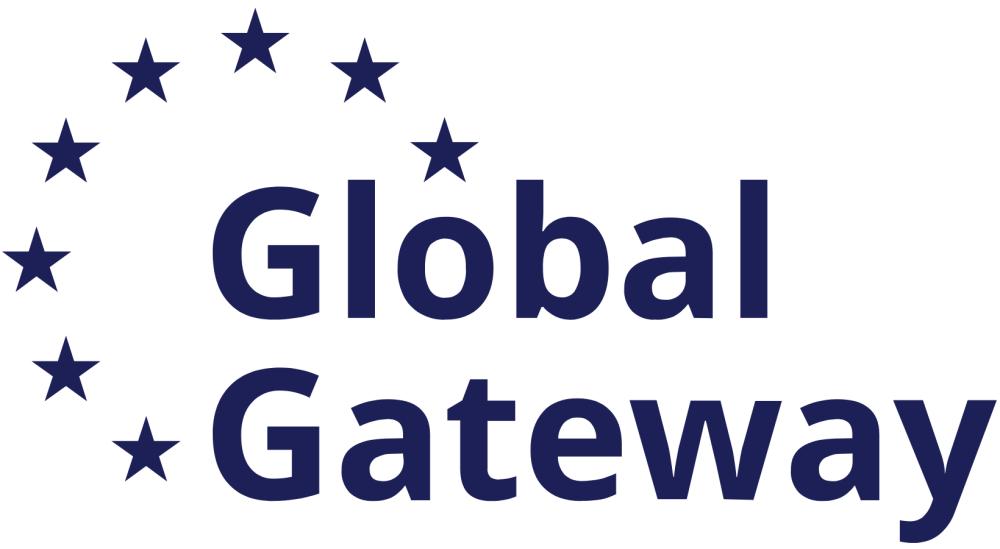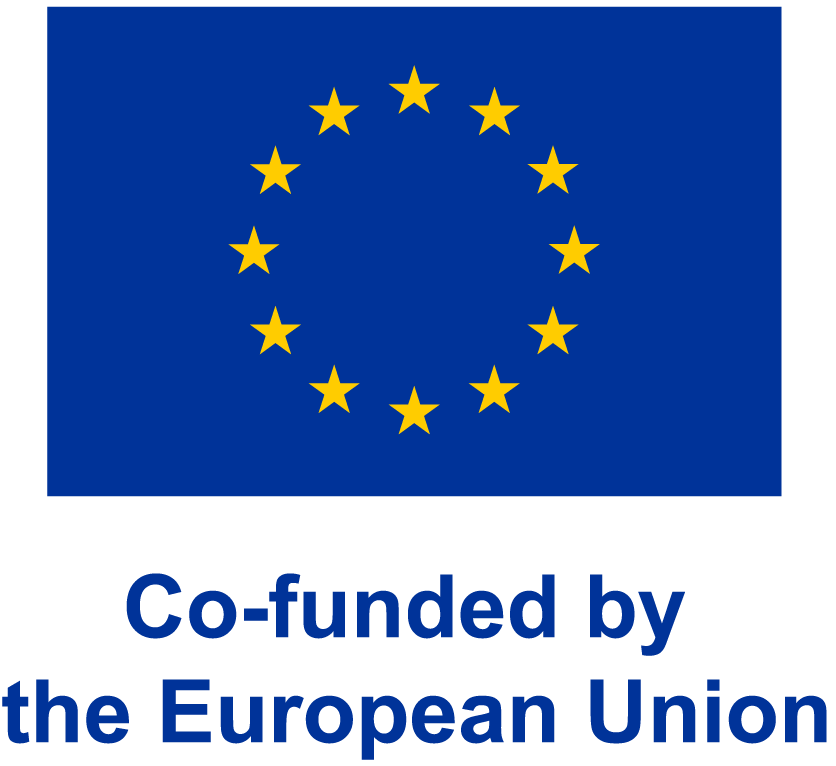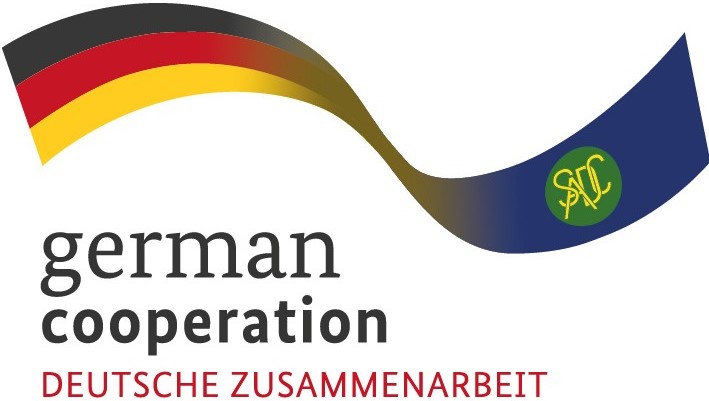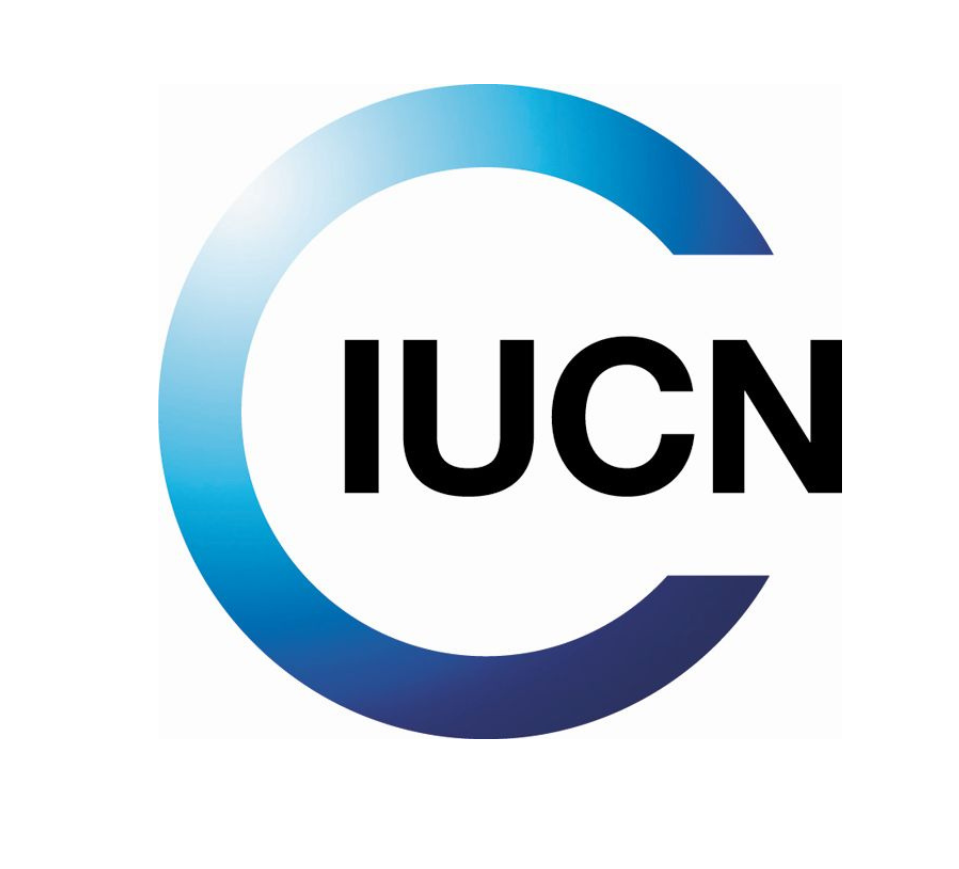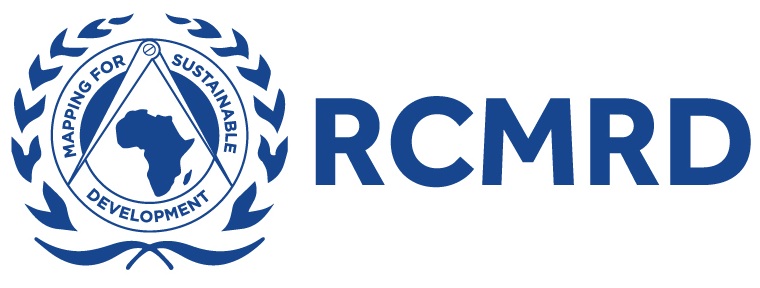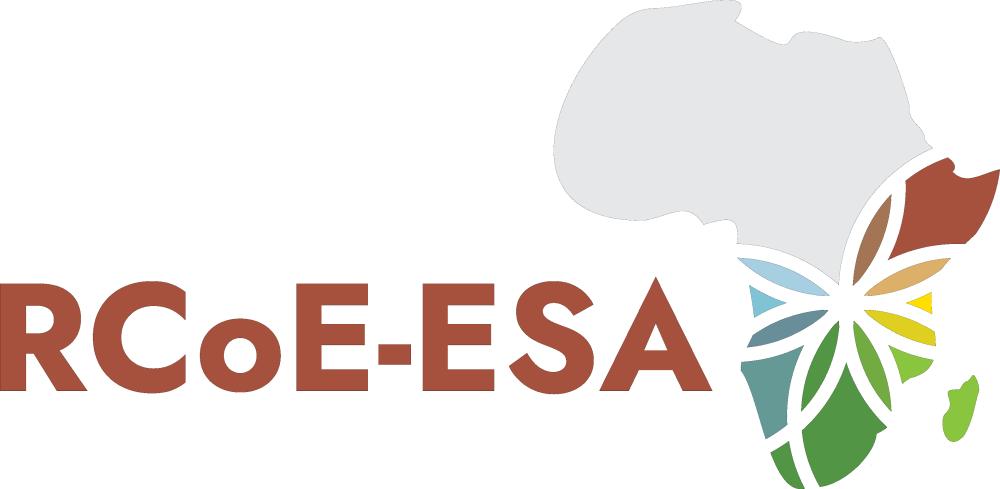 Translate
Translate
News
Southern African Wildlife College Hosts a SADC TFCA Peer-to-Peer Learning Exchange in the Great Limpopo TFCA (GLTFCA)
29 September 2025
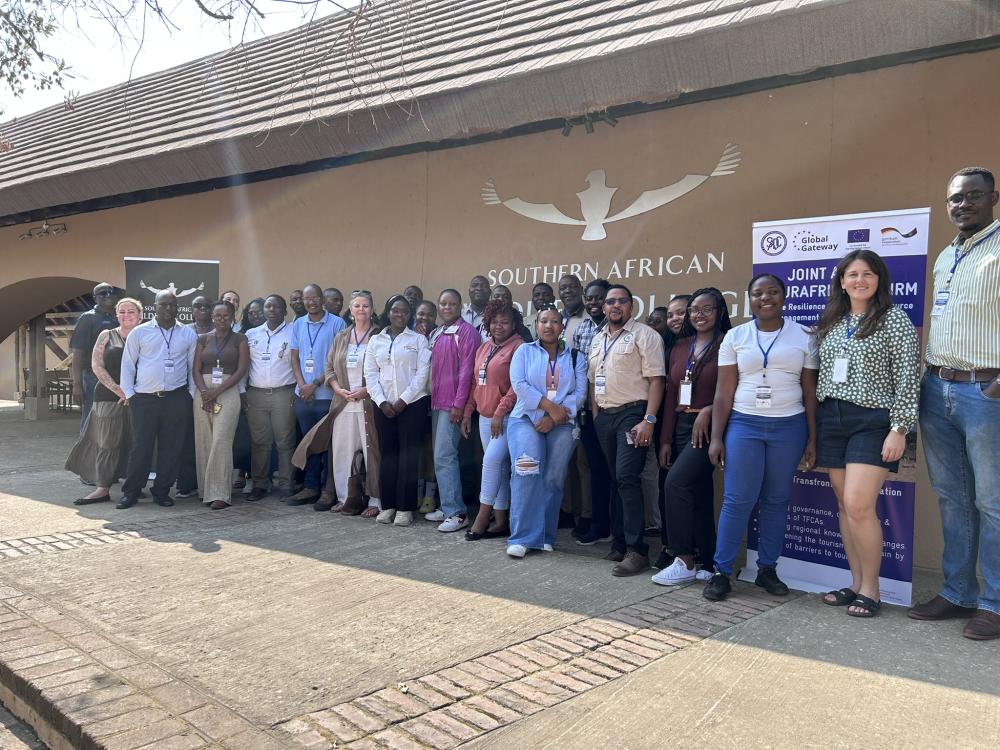
The Southern African Wildlife College (SAWC), in partnership with the African Leadership University – School of Wildlife Conservation (ALU-SOWC), and African Wildlife Economy Institute (AWEI), Stellenbosch University hosted a Southern African Development Community (SADC) Transfrontier Conservation (TFCA) Area Peer-to-Peer Learning Exchange on Wildlife-Based Economy (WBE) and Livelihoods in the South Africa component of the GLTFCA from 31 August to 06 September 2025.
Supported by the Joint Action NaturAfrica/Climate Resilience and Natural Resource Management (C-NRM) Programme - a partnership programme between SADC, the European Union and the German Government and implemented by the Deutsche Gesellschaft für Internationale Zusammenarbeit (GIZ). The 5-day exchange brought together 25 participants (11 women and 13 men) from 12 Transfrontier Conservation Areas (TFCAs) across the SADC region. The programme aimed to promote knowledge sharing, collaboration, and innovative models to strengthen wildlife economies as a driver for improved livelihoods and regional prosperity.
Key objectives included:
• Knowledge Sharing: Showcasing best practices and different wildlife-based enterprises models including community-led enterprises.
• Capacity Development: Enhancing skills in wildlife-based enterprise development, conservation finance, and natural resource management.
• Networking: Building collaborative partnerships among communities, SADC Member States, NGOs, and the private sector.
• Policy Advocacy: Encouraging dialogue on frameworks to support wildlife economies across TFCAs.
To strengthen knowledge, networks, and policy, the exchange combined interactive discussions, immersive field visits to highlight opportunities in wildlife-based economies and a Sustainable Finance Bootcamp, delivered by the Sustainable Finance Coalition. The sessions introduced participants to practical tools for mobilising finance and developing bankable proposals for WBE projects. With many community enterprises struggling to secure long-term funding, the bootcamp equipped participants with strategies to design financially viable initiatives, attract investment, and reduce dependency on short-term donor cycles. This training underscored that building a sustainable wildlife economy requires not only innovative ideas, but also strong financial planning, investment readiness, and access to capital.
An important element of the exchange had participants engaged with institutions the following institutions:
SANParks shared insights into how national parks can serve as hubs for the wildlife economy. Their work in the Kruger National Park and surrounding areas focuses on creating livelihood opportunities linked to conservation – including eco-tourism, natural resource use, and partnerships with local enterprises. Dr. Louise Swemmer presented on initiatives that integrate communities into decision-making and support them to derive tangible economic benefits from protected areas, reinforcing the message that thriving communities are essential for thriving ecosystems.
The K2C Biosphere Reserve, a UNESCO-designated site, is advancing the Pro-Nature programme, which supports local economies through nature-based enterprises. Ms. Resoketswe Mafogo highlighted projects ranging from eco-tourism ventures to value addition in natural products, all designed to improve livelihoods while safeguarding biodiversity. The K2C model demonstrates how biospheres can act as living laboratories for testing innovative conservation-livelihood approaches and scaling them across the region.
The Timbavati Foundation showcased initiatives that directly link wildlife conservation to community upliftment. The Foundation’s supply development programme, meat processing facility and tannery illustrate how conservation areas can create employment, skills training, and enterprise opportunities for neighbouring communities. Participants also explored the role of circular economy approaches, such as value chains in wildlife products to ensure that conservation generates lasting, shared prosperity. The Foundation also works in partnership with innovative enterprises such as the Kulani Collective and The Leather Alchemist, which are expanding opportunities in product design and manufacturing. These collaborations not only create value-added markets for wildlife by-products but also provide training, mentorship, jobs, and enterprise development for local youth and women. By linking conservation to creative industries, these initiatives illustrate how wildlife economies can diversify livelihoods and advance inclusive growth.
Conservation Outcomes delivered a presentation on “The Business of Conservation” and highlighted the potential of South Africa’s biodiversity economy to drive conservation and socio-economic development. It explores key pillars such as nature-based tourism, hunting, live sales, wildlife value chains, and bio-trade. Case studies, including the Babanango Game Reserve and the Greater Kruger Area, illustrate how protected areas can be financially sustainable while creating jobs, community benefits, and ecological restoration. Greg Martindale also emphasises the role of management plans, co-management models, and innovative value chains like game meat markets in shaping a resilient WBE that links sustainable livelihoods with effective conservation.
The Baobab Foundation presented innovative bioprospecting projects that demonstrate how local natural resources can be transformed into sustainable livelihood opportunities. By responsibly harvesting and processing baobab products, the Foundation enables communities to benefit economically while protecting a culturally significant species. This approach also reinforces the importance of indigenous knowledge systems (IKS), ensuring that cultural heritage and biodiversity conservation go hand-in-hand with market opportunities. Both the Timbavati and Baobab Foundations have established long-term funding models whereby a certain percentage of the revenues created are channelled into the foundations and thus contribute to empower the communities in the long term.
Another inspiring example was African Caribbean Aloe Products, which showcased how small enterprises can enter regional and global value chains through bioprospecting. The initiative turns indigenous aloe resources into commercial products, creating both jobs and export opportunities. By formalising existing opportunities and investing in community capacities, this enterprise reflects the broader potential of the wildlife economy to position Southern Africa as a leader in sustainable natural products.
Reflections and key takeaways emphasised that wildlife-based economies must be people-centred, sustainable, and innovative. Communities often remain unaware of the potential to monetise local resources and cultural knowledge, highlighting the need for stronger capacity building and market access support.
Participants stressed the importance of:
• Moving beyond donor-driven models to sustainable social enterprises.
• Starting small but scaling with vision to unlock value chains.
• Ensuring transparency and safeguards in NGO-community partnerships.
• Recognising indigenous knowledge systems (IKS) as key part of the wildlife products development and economy.
• Aligning and developing policies and incentives that support enterprise development and attract investment.
The exchange reinforced that a thriving wildlife-based economy requires collaboration, innovation, and regulatory support, ensuring that benefits reach local communities while safeguarding biodiversity.
Looking ahead, the lessons and networks built during this Peer-to-Peer learning exchange will continue to inform SADC’s implementation of the Wildlife-Based Economy Strategic Framework with establishing a SADC TFCA Community of Practice, while positioning wildlife-based businesses and livelihoods as a cornerstone of both conservation and sustainable development.
For more information contact Dr. Thabang Teffo on tteffo@sawc.org.za or Rorly Sherwen on rorly.sherwen@giz.de
Supported by the Joint Action NaturAfrica/Climate Resilience and Natural Resource Management (C-NRM) Programme - a partnership programme between SADC, the European Union and the German Government and implemented by the Deutsche Gesellschaft für Internationale Zusammenarbeit (GIZ). The 5-day exchange brought together 25 participants (11 women and 13 men) from 12 Transfrontier Conservation Areas (TFCAs) across the SADC region. The programme aimed to promote knowledge sharing, collaboration, and innovative models to strengthen wildlife economies as a driver for improved livelihoods and regional prosperity.
Key objectives included:
• Knowledge Sharing: Showcasing best practices and different wildlife-based enterprises models including community-led enterprises.
• Capacity Development: Enhancing skills in wildlife-based enterprise development, conservation finance, and natural resource management.
• Networking: Building collaborative partnerships among communities, SADC Member States, NGOs, and the private sector.
• Policy Advocacy: Encouraging dialogue on frameworks to support wildlife economies across TFCAs.
To strengthen knowledge, networks, and policy, the exchange combined interactive discussions, immersive field visits to highlight opportunities in wildlife-based economies and a Sustainable Finance Bootcamp, delivered by the Sustainable Finance Coalition. The sessions introduced participants to practical tools for mobilising finance and developing bankable proposals for WBE projects. With many community enterprises struggling to secure long-term funding, the bootcamp equipped participants with strategies to design financially viable initiatives, attract investment, and reduce dependency on short-term donor cycles. This training underscored that building a sustainable wildlife economy requires not only innovative ideas, but also strong financial planning, investment readiness, and access to capital.
An important element of the exchange had participants engaged with institutions the following institutions:
SANParks shared insights into how national parks can serve as hubs for the wildlife economy. Their work in the Kruger National Park and surrounding areas focuses on creating livelihood opportunities linked to conservation – including eco-tourism, natural resource use, and partnerships with local enterprises. Dr. Louise Swemmer presented on initiatives that integrate communities into decision-making and support them to derive tangible economic benefits from protected areas, reinforcing the message that thriving communities are essential for thriving ecosystems.
The K2C Biosphere Reserve, a UNESCO-designated site, is advancing the Pro-Nature programme, which supports local economies through nature-based enterprises. Ms. Resoketswe Mafogo highlighted projects ranging from eco-tourism ventures to value addition in natural products, all designed to improve livelihoods while safeguarding biodiversity. The K2C model demonstrates how biospheres can act as living laboratories for testing innovative conservation-livelihood approaches and scaling them across the region.
The Timbavati Foundation showcased initiatives that directly link wildlife conservation to community upliftment. The Foundation’s supply development programme, meat processing facility and tannery illustrate how conservation areas can create employment, skills training, and enterprise opportunities for neighbouring communities. Participants also explored the role of circular economy approaches, such as value chains in wildlife products to ensure that conservation generates lasting, shared prosperity. The Foundation also works in partnership with innovative enterprises such as the Kulani Collective and The Leather Alchemist, which are expanding opportunities in product design and manufacturing. These collaborations not only create value-added markets for wildlife by-products but also provide training, mentorship, jobs, and enterprise development for local youth and women. By linking conservation to creative industries, these initiatives illustrate how wildlife economies can diversify livelihoods and advance inclusive growth.
Conservation Outcomes delivered a presentation on “The Business of Conservation” and highlighted the potential of South Africa’s biodiversity economy to drive conservation and socio-economic development. It explores key pillars such as nature-based tourism, hunting, live sales, wildlife value chains, and bio-trade. Case studies, including the Babanango Game Reserve and the Greater Kruger Area, illustrate how protected areas can be financially sustainable while creating jobs, community benefits, and ecological restoration. Greg Martindale also emphasises the role of management plans, co-management models, and innovative value chains like game meat markets in shaping a resilient WBE that links sustainable livelihoods with effective conservation.
The Baobab Foundation presented innovative bioprospecting projects that demonstrate how local natural resources can be transformed into sustainable livelihood opportunities. By responsibly harvesting and processing baobab products, the Foundation enables communities to benefit economically while protecting a culturally significant species. This approach also reinforces the importance of indigenous knowledge systems (IKS), ensuring that cultural heritage and biodiversity conservation go hand-in-hand with market opportunities. Both the Timbavati and Baobab Foundations have established long-term funding models whereby a certain percentage of the revenues created are channelled into the foundations and thus contribute to empower the communities in the long term.
Another inspiring example was African Caribbean Aloe Products, which showcased how small enterprises can enter regional and global value chains through bioprospecting. The initiative turns indigenous aloe resources into commercial products, creating both jobs and export opportunities. By formalising existing opportunities and investing in community capacities, this enterprise reflects the broader potential of the wildlife economy to position Southern Africa as a leader in sustainable natural products.
Reflections and key takeaways emphasised that wildlife-based economies must be people-centred, sustainable, and innovative. Communities often remain unaware of the potential to monetise local resources and cultural knowledge, highlighting the need for stronger capacity building and market access support.
Participants stressed the importance of:
• Moving beyond donor-driven models to sustainable social enterprises.
• Starting small but scaling with vision to unlock value chains.
• Ensuring transparency and safeguards in NGO-community partnerships.
• Recognising indigenous knowledge systems (IKS) as key part of the wildlife products development and economy.
• Aligning and developing policies and incentives that support enterprise development and attract investment.
The exchange reinforced that a thriving wildlife-based economy requires collaboration, innovation, and regulatory support, ensuring that benefits reach local communities while safeguarding biodiversity.
Looking ahead, the lessons and networks built during this Peer-to-Peer learning exchange will continue to inform SADC’s implementation of the Wildlife-Based Economy Strategic Framework with establishing a SADC TFCA Community of Practice, while positioning wildlife-based businesses and livelihoods as a cornerstone of both conservation and sustainable development.
For more information contact Dr. Thabang Teffo on tteffo@sawc.org.za or Rorly Sherwen on rorly.sherwen@giz.de



